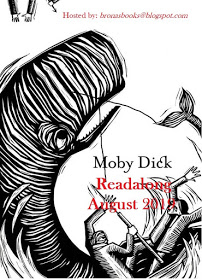Part of the pleasure of reading classics as an adult is the joy of reading and noting words used in the book which could and should be added to one's vocabulary.
I'm reading Moby Dick. I've run across lots of words I plan to save and use in the future. These are words, by and large, that I learned in school, but which I rarely or never use in conversation; I want to use these in conversation. For now, I'm skipping all the odd words, the whaling words, but I may come back to that later. Here's my list.
Portentous (pg. 10): ominous
Catarrh (pg. 14): a buildup of mucous in the nose or throat
Obstreperously (pg. 14): noisily, rambunctiously
Expostulations (pg. 27): expressions of strong disapproval
Indecorous (pg. 28): in bad taste, unrestrained
Ablutions (pg. 28): washings
Skylarking (pg. 29): fooling around
Imputable (pg. 32): attributable
Flouts at (pg. 39): openly disregards
Inexorable (pg. 48): unstoppable
Sagacity (pg. 67): wisdom
Blandishments (pg. 84): flattering or pleasing statements
Ineffable (pg. 93): too great to be described in words
Succor (pg. 105): help
Puissant (pg. 107): powerful
Vicissitude (pg. 112): a change of circumstance or fortune
Engendering (pg. 113): giving rise to
Craven (pg. 115): cowardly
Unvitiated (pg. 117): unspoiled, unmixed
Peremptory (pg. 119): bossy, imperious
Deprecating (pg. 124): express disapproval of
Gregarious (pg. 135): sociable
Prodigious (pg. 139): great in extent, size, or degree
Expatiate (pg. 151): write about at length
Turbid (pg. 165): cloudy, opaque
Sultry (pg. 212): hot and humid
Suffusingly (pg. 221): by spreading out
Indolently (pg. 249): lazily
Effulgent (pg. 272): brightly shining
Bilious (pg. 314): nauseating
Gingerly (pg. 321): cautious, careful
Inveterate (pg. 366): habitual, of longstanding
Engendered (pg. 372): created
Inculcating (pg. 391): instructing others through repetition
Timorous (pg. 409): timid
Luridly (pg. 410): shockingly
Recondite (pg. 416): obscure, not easy to understand
Plethoric (pg. 420): overabundant, over-giving
Unvitiated (pg. 423): unreduced, undebased
Morass (pg. 427): an area of low-lying ground
Elucidated (pg. 443): clarified
Attenuated (pg. 451): reduced or made thin
Stolidity (pg. 463): apathy, lack of emotion
Cogent (pg. 466): convincing
Gambol (pg. 533): frolic
Pertinacious (pg. 546): stubborn, persistent
Moby-Dick by Herman Melville is in the public domain.
Page numbers shown are from the first American edition, published in 1851.
Wondrous Words Wednesday is a weekly meme where we share new (to us) words
that we’ve encountered in our reading.
If you want to play along, grab the button,



You are an incredibly careful reader to keep a list like this! I feel the same as you do about mot of the words: I know what they mean but they aren't in my active vocabulary, for the most part. Some of them would seem a little pretentious in ordinary conversation, but they are very good words.
ReplyDeletebest... mae at maefood.blogspot.com
I'd love to start using them and see how people react.
DeleteI can see why teachers use Moby Dick in the classroom. The vocabulary is amazing.
ReplyDeleteGood words which over here are used quite frequently, I even use quite few of them myself. Seems so strange that the English Language can differ so much and have differing meanings
ReplyDeleteYes, strange.
DeleteWell this is just cogent that we need to read more and especially books like this from our childhood. You've certainly opened my eyes to words and phrases not often used. Your blog has been very interesting to read, thank you :D
ReplyDeleteYep, though perhaps some of these words are recondite.
DeleteGreat list! The word Catarrh was a big one in my childhood as I had a great aunt who always talked about her Catarrh. :-)
ReplyDeleteIt's a perfect word for the Texas Gulf Coast.
DeleteThe only person I've ever heard use catarrh in every day language is my doctor. And I've used a few of the words like gingerly, sultry and gregarious when talking, but the rest I'm not even sure how to pronounce!
ReplyDeleteYes, me, too. But I did learn them in school.
DeleteWow, you found a lot of great words! I agree that it's fun to read classics to learn new words. You also discover words that have gone out of style. I love skylarking and will try to use it this week.
ReplyDeleteLovely list. Bring 'em back!
ReplyDelete